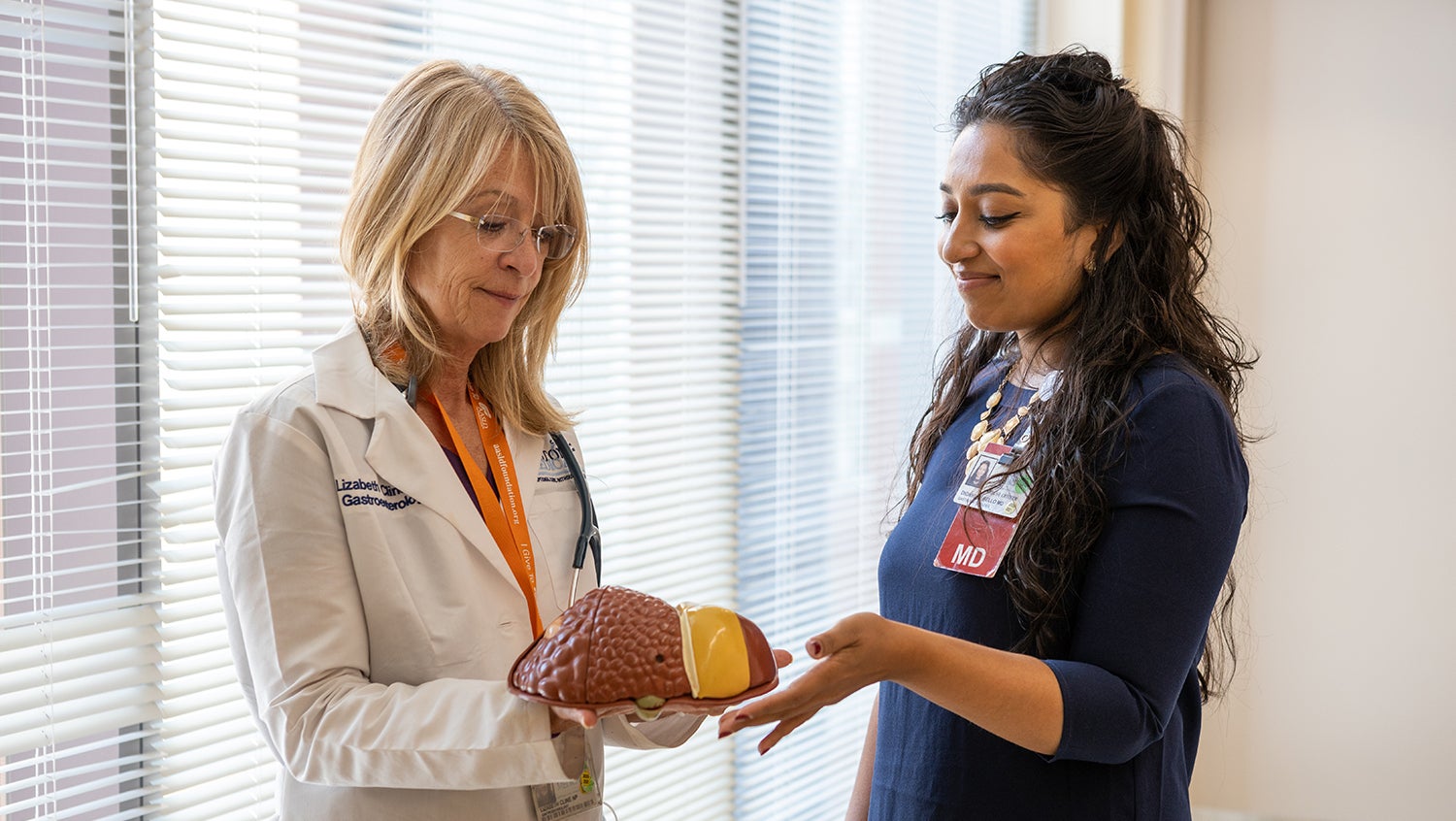
Bruno Debas
Gastroenterology is a male-dominated field, and the lack of gender parity has repercussions for physicians and patients. A new study offers ways to create change.
When gastroenterologist Michelle T. Long, MD, hit a roadblock arranging a meeting to discuss a research idea with Echosens, a medical device company specializing in liver disease, she asked a senior hepatologist in her mentor-mentee match program for his help. As it turns out, that hepatologist already had a meeting scheduled with a contact at the device company for the following day. So, he connected Long to his contact and vouched for her work—a moment she says helped launch her research career.
That introduction led to a research agreement with the medical device company, which funded her use of a novel imaging tool for her work with the Framingham Heart Study—a project that became critical in helping her secure additional funding for her continued research to address crucial knowledge gaps in nonalcoholic fatty liver disease.
“A lot of scientific work is team-oriented, and projects come from collaborations with multiple institutions,” says Long, who currently works at Boston Medical Center (BMC). “Women need strong scientific networks to make these opportunities come to fruition.”
Current healthcare trends affecting women in gastroenterology
Building connections and networks are one way to drive gender parity in gastroenterology—a traditionally male-dominated field that lags behind many healthcare specialties in terms of number of women entering the workforce. According to the Association of American Medical Colleges, 82% of all gastroenterologists are men, which would align gastroenterology with another study on the most male-dominated medical fields.
Long, alongside her gastroenterologist colleague at BMC Sharmeel K. Wasan, MD, and Samantha Chua, MD, a resident from Boston University School of Medicine, co-authored an article recently published in Gastroenterology on how to build gender equity in their branch of medicine.
In their research, they cited concerning trends about the treatment of women in the field. When it comes to pay, female gastroenterologists earn 15% less than their male peers. Among medical specialists overall, men make nearly one-third more in compensation than women.
The gender gap also remains sizable in leadership positions. A 2015 survey of female physicians found that the vast majority felt women should be in positions of leadership, but only a small percentage of program leaders and division chiefs at gastroenterology fellowship programs were found to be women. On editorial boards at gastroenterology and hepatology journals, female membership had improved but remains low.
And a disproportionate percentage of 1,000 female gastroenterologists surveyed in 2016 perceived and experienced sexual harassment from superiors, with almost half saying it negatively affected their careers.
Based on their findings and a desire to create a safe and inclusive environment, the doctors put out a call to action for gender equity in their field.
How to support gender equity in gastroenterology
Long, Wasan, and Chua’s guidance focuses on several key areas in need of improvement for the gastroenterology field. Long and Wasan also spoke with HealthCity about these action steps.
Increase representation of women: “This needs to be a top-down approach,” says Long. “For example, several years ago, the NIH director said he would no longer be on panels led exclusively by men. That’s a powerful statement. Leaders in subspecialties could take a similar stance to ensure that women are represented in greater proportions on editorial boards and panels.”
Understand the value of diversity: “Patients often feel more comfortable with providers of the same gender, especially when talking about sensitive topics that come up in [gastroenterology],” says Long. “Having a diverse faculty also enriches the organizations they work for, bringing in new perspectives and ideas.”
Develop mentorship programs and training: Data show that the number of women specializing in gastroenterology is increasing, and they will benefit from access to mentors and other role models, they write. Current leaders can advocate for those who are new to the field and help them to navigate their career path.
“Co-mentoring is a wonderful way to help those who are new to the field to push forward,” says Wasan. “Formalizing these relationships can be really helpful, so each party knows what the other is looking for and provides dedicated time.”
Institutions can foster these efforts by offering training programs for mentors on how to cultivate meaningful relationships with mentees from a variety of backgrounds. To build a strong pipeline of talent, they can also leverage institution-specific databases to match potential mentees and mentors.
Build sponsorship programs: Sponsors are critical for improving the landscape for women, says Long. A sponsor is generally a senior-level person who has power and influence and is invested in the career success of a protégé. The sponsor can provide credibility as well as access to opportunities they might not otherwise have. They might not necessarily be involved in the details of their protégé’s career development but can advocate on their behalf. For example, a sponsor might receive an invitation to be a speaker or a research partner and pass this opportunity along to their protégé.
Foster strong networks: Having a broad network can open doors to opportunities, such as participating in research projects—just like Long’s earlier experience. To encourage networking, the article’s authors wrote that it would be advantageous for there to be professional society databases where members could search for others who share their clinical and research interests. Employers could also encourage multidisciplinary research teams to include early-stage investigators and grand round programs to include a more diverse pool of participants.
Create a culture of transparency: Employers should publish compensation models that clearly outline benchmarks and pay grades, so everyone is clear on expectations for salary and benefits at each level of their career, the doctors suggested in their article.
“I’d advise those seeking to enter the field to work with a health system that has a culture that values this openness,” says Long. “In my role [at BMC], I’m very open with this information. I talk to trainees and use real numbers.”
Gather real-world data: Conducting surveys and data points is one place institutions can begin to understand barriers to gender equity. “I was talking with a peer reviewer on an editorial board who thought that perhaps women were being offered invitations to join editorial boards but were declining these,” says Long. “Yet the journal didn’t keep track of this data. Gathering metrics like this would be a good place to start.”
Provide leadership opportunities: Health systems should follow the lead of professional associations, such as the American Gastroenterological Association, which spearheaded a Future Leaders Program, according to Long and her fellow authors. This initiative helps cultivate leaders by providing networking, mentorship, and professional support. The American Society for Gastrointestinal Endoscopy has a similar program, connecting women who are early in their gastroenterology careers with professional skills development and networking building.
Incorporate business skills: “We should be educating young faculty at medical school, in fellowships, and during residency about what is needed to develop their careers,” says Wasan.
Some fellowship programs offer a “chief” fellowship role, where fellows can learn about administration, education, and leadership aspects of the field. Academic institutions could also offer training in skills such as conflict resolution and negotiation.
There is some encouraging news, too: The share of women entering gastroenterology fellowships continues to trend upward and is twice what it was 20 years ago. The next key step is to ensure there is parity across leadership and research opportunities.
“We wanted to put information out to thought-leaders about how to be proactive in engaging women and truly diversifying the field,” Long says. “Diversifying the field in leadership positions will take a deliberate effort.”


